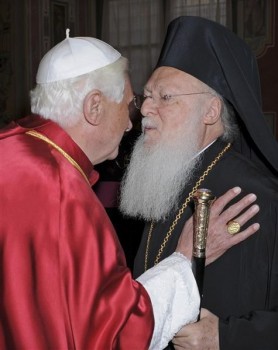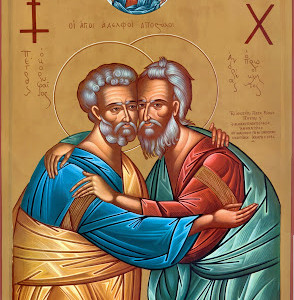Dr. Erasmo Leiva-Merikakis, former professor of Literature and Theology at the University of San Francisco, has written two volumes of what will eventually be a three-volume meditation on the Gospel of Matthew: Fire of Mercy, Heart of the Word (vol I; vol. II). The bits that I’ve read so far have been amazing. Leiva-Merikakis speaks Greek, French, Latin, and English, and is able to draw out nuance you wouldn’t get from just reading the English (for example, what’s meant in the Greek by “blessed” in the Beatitudes). He’s also a faithful and devout Catholic, and does theology “on his knees,” so to speak.
| Icon of Saints Peter and Andrew given by Patriarch Athenagoras I, to Pope Paul VI in 1964 |
Last week, Fr. Kelly drew our attention to how Leiva-Merikakis treats the passage I discussed yesterday from Matthew 16:13-20. In it, he warns that because “of the deplorable divisions presently existing among Christians, this particular passage is highly charged with polemical possibilites,” and that both Catholics and Protestants tend to overemphasize parts of the passage, with Catholics overemphasizing the role of papacy, to the detriment of the college of bishops (see Matthew 18:18), and Protestants spiritualizing and universalizing the passage so much that it become merely “rhetorical.”
I’d add an additional self-rebuke as well. As Catholics (particularly those of us who engage in apologetics), we can become so obsessed with the implications for the papacy, that we can miss the forest for the trees — that this is a passage in which Peter, for the first time, realizes that Jesus is the Christ. This point — that Jesus is Christ — is an infinitely more important one. Jesus could have chosen anyone to be pope, or could have designed an entirely different structure for the Church. But Peter couldn’t have been saved by any other Christ, and nor can we.
Having said that, Leiva-Merikakis then lays out the case that the early Church, including the East, viewed Peter as the Chief Apostle in a way that was more than merely honorary. He writes:
Despite their later quarrels with the See of Rome regarding the modality of the Petrine office and primacy, the Greeks from early on routinely attributed to Peter the title of koryphaios of the apostles, a title that sees in him the “head” (kara), “chief”, or “prince” of the apostolic college.
 |
| St. John Chrysostom |
Leiva-Merikakis provides two important examples to support this claim. The first is from St. John Chrysostom (349-407 A.D.). St. John Chrysostom is important for a number of reasons. He’s the author of the Divine Liturgy most commonly used within Eastern Orthodoxy, and his importance to the development of Orthodox theology can be hardly overstated: he’s their version of our St. Augustine.
In the West, we call him a Doctor of the Church, placing in him with only three-two (soon to be thirty-three) other influential theologians. In the East, they go beyond that, declaring him one of the Three Holy Hierarchs. He was bishop of Antioch, where St. Peter himself served as bishop (see Galatians 2). And he would later become Archbishop of Constantinople, meaning that he’s what the Eastern Orthodox would now call the “Ecumenical Patriarch.” So here’s what the Patriarch, St. John Chrysostom, had to say:
It is a prerogative of the dignity of our city [that is, Antioch] that, from the beginning, it received as master the prince of the apostles. In fact, it was a just thing that this city – which was glorified by the name of “Christians” before the rest of the earth – should receive as shepherd the prince of the apostles. When we received him as master, however, we did not keep him forever but rather yielded him to the royal city of Rome. Therefore, we do not hold the body of Peter, but we hold the faith of Peter as we would Peter himself. As a matter of fact, as long as we hold the faith of Peter, we have Peter himself.
The other example Leiva-Merikakis pointed out which I found fascinating is from the Byzantine Liturgy — that is, the Liturgy used by all of the Eastern Orthodox churches. In English, Leiva-Merikakis writes:
For instance, in the liturgy of the Feast of the Apostolic College, observed in the Byzantine calendar on June 30, the day after the Feast of Sts. Peter and Paul, patronal feast of Rome, we hear Peter addressed as “Peter the first-chosen, the chief shepherd,” and also as “the rock of the faith and the holder of the keys of grace”. Thus, the Greek liturgy already provides an expressive exegesis of our passage.
(Leiva-Merikakis actually includes the Greek, which you can find at page 511 here).
 |
| Pope Benedict XVI and Ecumenical Patriarch Bartholomew (Successors of Saints Peter and Andrew) |
I don’t pretend that this information is going to suddenly end the Great Schism, but I do think it’s important to remember how the East used to view Peter. Leiva-Merikakis quite convincingly shows that centuries prior to the Great Schism, the East (including even the future Patriarch of Constantinople) recognized St. Peter as having something more than a mere “primacy of honor,” that Peter wasn’t simply “first amongst equals.”
Rather, they viewed him as “the Prince of the Apostles,” “the Chief Shepherd,” “the Rock of the Faith,” and “the Holder of the Keys of Grace.” And these weren’t some stray opinions, but the faith declared in the Divine Liturgy itself (yet another example of the importance of the Liturgy).
In light of Matthew 16:17-19, the specific titles given leave no question as to the Eastern Church’s original belief that the Church was built upon St. Peter, the first-chosen and Prince of the Apostles. And St. John Chrysostom tells us quite clearly that after serving as Bishop of Antioch, this same Peter moved to the royal city, Rome. That’s virtually everything the Catholic Church asserts today.

“he’s their version of our St. Augustine.”
To be fair, in the Early Church, the East really does outshine the West in terms of theologians. Thank goodness we got Augustine!
Very true. And if the West didn’t have North Africa (with Optatus, Cyprian and Augustine), the comparison would be much more embarrassing.
Obviously, the situation has changed quite markedly since then, given the role of scholasticism, the universities, and the monasteries.
Spot on to highlight the good doctor’s writings on Matthew. I found them excellent and interesting reading; rather than sit on my book shelf, my copies went to the local parish library immediately.
Thanks for spreading the word.
Great stuff here! I’m interested in picking up a copy of the Doctor’s work now.
I would like to point out, though, that the perception of perhaps too much focus on the role of Peter in Matthew 16 by Catholics is probably due to having to defend it from all sides so often.
A hearty, brotherly (from afar) knucks on the last sentence of that third paragraph. Therein abides all hope, even for apologists.
Drew
mrflibbleisvryx,
Agreed. One reason we focus on the things that divide us is that’s what needs to be said. I don’t need to tell Protestants that Jesus is the Christ. They get it. But they often don’t the parts of this passage about Peter, so in some ways, there’s more to be said, even though Peter being Pope is less important than Jesus being Christ.
Drew,
Thanks! I had to look up what “knucks” meant. Is that a non-US phrase, or am I just getting old?
God bless,
Joe.
Only if Texas (by way of Arkansas) doesn’t count as home country. I would say “Pound it” enjoys wider usage, and who can forget the [terrorist] Fist Bump of the Royal Obamas? But your old school Catholicism is cooler than any new-agey hipster slang.
Keep it real.
Drew
I knew “rock” and “fist bump”… I’ll have to store “knuckles” upstairs.
P.S. I don’t know if we should entertain the possibility of Texas not being in the US… they may take us up on it!
Joe,
Thank you for this. I shared it with someone I am dialoging with who is considering the Church and EO.
The East never stopped calling Peter all of those things. We also have an interesting array of exaltations for the Popes of Old Rome and Alexandria, the Ecumenical Patriarch and others.
The thing it seems you’re missing is “both-and.” You seem to be saying that either Peter was ‘only’ First among Equals, or all of those cool titles given to him must apply.
For us, it’s both-and, not either-or.